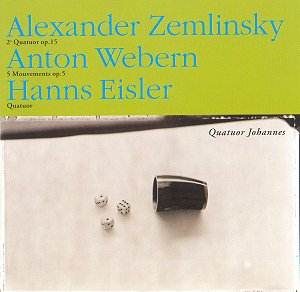The
common link between the string quartets on this new release from
the French Mecenat Musical label is renowned master composer Arnold
Schoenberg. Both Eisler and Webern studied under Schoenberg and
Zemlinsky was briefly Schoenberg’s composition teacher; as well
as his brother-in-law. It is quite some time since I heard both
Webern’s Five Pieces for String Quartet and Zemlinsky’s
String Quartet No.2 and it was good to reacquaint myself
with these interesting and relatively challenging scores. Although
I have to say that I was hearing Eisler’s String Quartet
for the first time.
German-born
Hanns Eisler studied with Schoenberg for four years before an
acrimonious split. Some fifteen years later they were however
to become reconciled whilst in exile in the USA. The String
Quartet, composed in New York in 1937, uses serial
techniques that Eisler considered easy to understand, yet is generally
accepted as a difficult and challenging work. Quatuor Johannes
apply all their skill and attention but as far as I’m concerned
to no avail as I find the work arduous and unwelcoming; not so
much austere as complicated and confusing. Eisler’s String
Quartet is certainly not a work that I will be revisiting
too soon.
Anton
Webern was not a miniaturist composer but a master of composing
perfect miniature pictures of stunning focus. The Five Pieces
for String Quartet Op.5 which is effectively a suite of short
pieces, is an early example of a most personal serial style of
composition that he had developed independent from Schoenberg.
No note or second seems to be wasted nor any idea duplicated;
every single detail has an expressed purpose. The score is exceedingly
sparing in its use of resources with a real sense of tension in
the writing. Quatuor Johannes successfully offer a most spacious,
precisely shaped and transparent performance of great technical
accomplishment.
Anton
von Zemlinsky rarely used atonality unlike his one time protégé,
Schoenberg. Zemlinsky’s works are forward-looking whilst remaining
relatively accessible to the listener. The String Quartet No.2
Op.15 is a monumental work and Zemlinsky expertly makes the
piece sound like a symphony orchestra, yet manages to retain an
innate beauty and richness. Influential music writer Norman Lebrecht
has described the quartet as, "a distinctly forward-looking
masterpiece whose emotional density steadily lightens into something
like the nervous energy of 1920s Berlin." Quatuor Johannes
have complete measure of the work’s massive sweep and its atmosphere
of brooding intensity. These are taut and compelling performances
which expertly extract the contrasting moods and wide range of
expression in the score.
The
sound quality from the Mecenat Musical engineers is the best that
I have heard on any review release this year. The booklet notes
are most informative about the featured scores yet provide no
information about the performers and translate no details into
English about the recording.
The
Webern and Zemlinsky scores are indispensable in any chamber music
collection and these performances are out of the top-drawer.
Michael
Cookson
